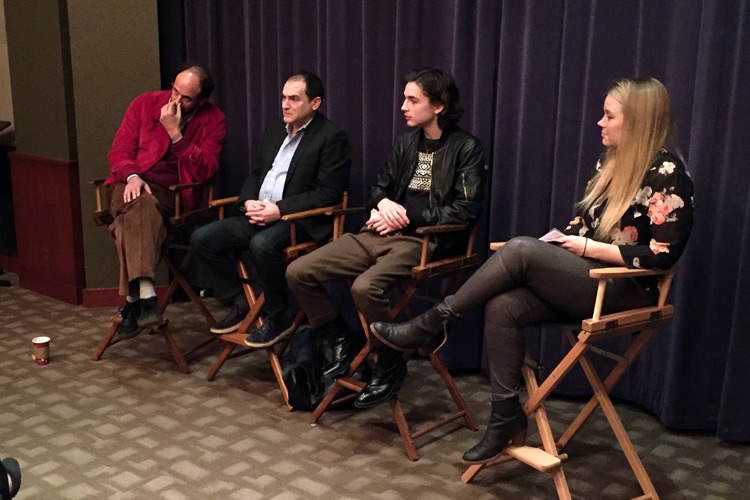The following questions and answers are excerpted from a conversation that followed the NBR screening of Call Me by Your Name.
The final scene between the father and son is so moving and beautiful, what was it like shooting that scene and what did it mean to you?
Michael Stuhlbarg: Rarely in filmmaking does one get to shoot things in order, but in this case, I had plenty of time because we shot that at the very end of the production. I got to live with and watch as Armie Hammer and Timothée got to know each other, rehearse, perform, grow, and make observations of what they were doing. I had a bird’s eye view of watching this, leaving me with a lot of time to contemplate it. On the day we shot that scene, both of us were ready to be in that moment. I had such a wonderful time watching and working with Timothée, so I felt like a father and had pride watching him grow as an actor.
Timothée Chalamet: Michael is like a hero of mine, so for me the focus was just to be a fly on the wall and steer clear to let the master go to work. This scene was a bit of an acting exercise as I was able to just genuinely listen and react.
“What we do at it’s best brings people together and feel less alone.”
What was it like making a home within this film, to create pieces of this life, and shoot in real places?
Chalamet: I was doing a play at the Manhattan Theater Club and Luca asked me to come out to Italy right after the play. It made sense to have that time a month before shooting to improve my Italian, master the piano, and learn guitar. There’s this tonal inflection of the town that ingratiated itself the more time I spent there as I met people and lived as Elio would.
Luca Guadagnino: I wanted the movie to have the medium of film be as unobtrusive as it could be. I wanted to make sure that cinema didn’t get in the way of the characters and story. Shooting where I lived was the most direct approach, including shooting with one camera and one lens and arranging the scene from the standpoint of how the characters behaved in the given space.
How did shooting on a single lens inform the way that you decided to move the camera and the way that the actors saw the camera?
Guadagnino: We added the limit of the single lense because Sayombhu Mukdeeprom, the cinematographer, and I decided that we didn’t want the movie to get in the way of the characters and the story. I think that cinema is about limits and compromise, so before having someone else ask me to compromise, I like to do that myself. I don’t believe in the concept of unlimited power and unlimited means, so I think it’s important to go around the obstacles you face. We were fortunate enough to have the cast completely invested in the making of the film, but we had a limited amount of money and time to make the film.
How do you find the space for that vulnerability that this film required?
Guadagnino: I think by choosing the right people to work with, it’s a more intuitive process. I hope that I have the ear for something fake or staged so we can avoid it, but I’ve been very lucky to meet wonderful collaborators. Watching the blossoming of Elio through Timothée was incredible because he never makes an obvious choice but is very precise and strong. To witness how Michael was propelling the story forward by his generous capacity to be in the background.
Sthulbarg: One longs for opportunities to open oneself up, so to be given an opportunity to say beautiful things or connect to each other is wonderful. What we do at it’s best brings people together and feel less alone. I think arriving at a space ready to tell the story you’ve been given to tell as honestly as you can is my responsibility. Show up ready and they’ll capture what you have to offer, and if you’re lucky, that’s what goes out into the world. We’re all in this life together, so how great is it when we are less alone? We all feel these things and it takes a team to make these things happen. How lovely when we can all come together to do that. So, it’s an opportunity for me. All you can do in our position is show up open, and that’s one of the things that is challenging to maintain that no matter what is happening in the world around us.
Chalamet: It’s the desire to be in things that can be talked about and actually affect the world in some way. In terms of being open and vulnerable, it’s about trust for the scene partner and director. It’s not being suspicious, but rather being trusting of all your collaborators.

